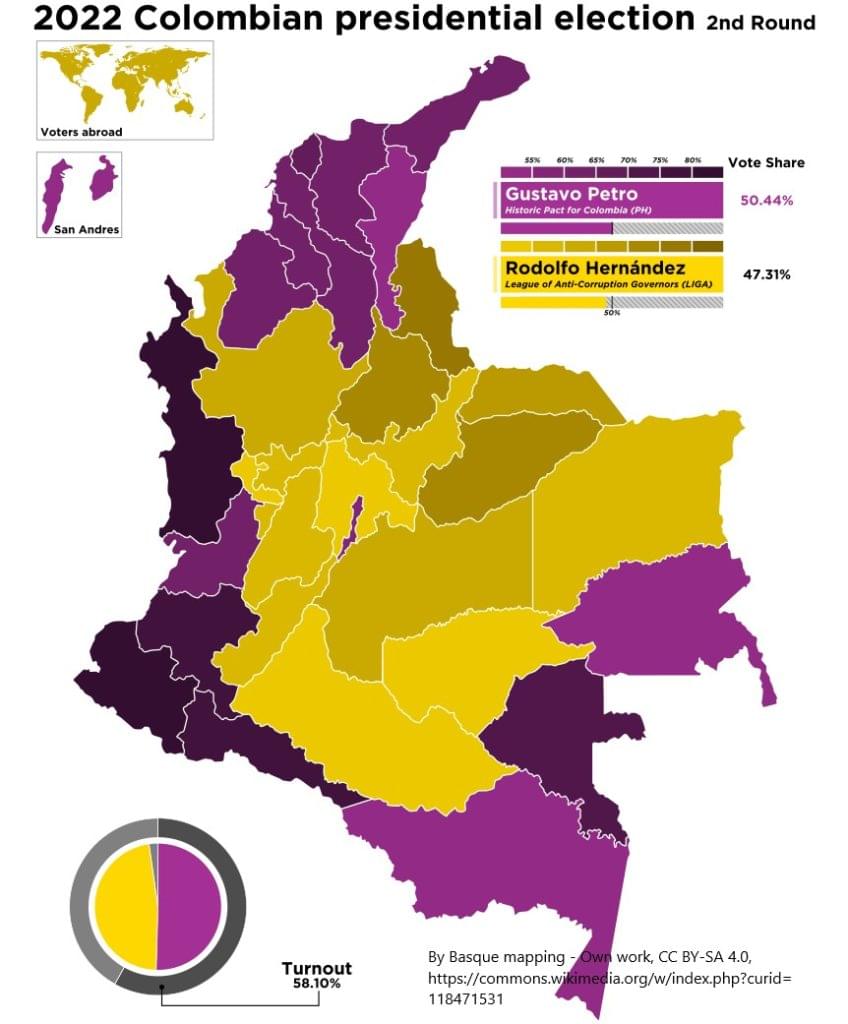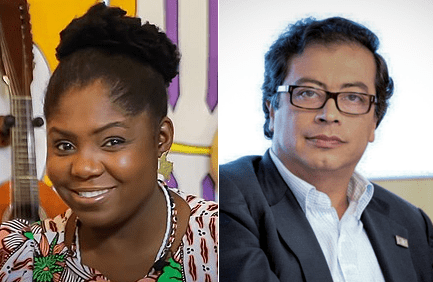The 19 June 2022 saw 58% of Colombians turnout to vote in the second and final round of Colombia’s Presidential elections. The highest percentage of citizens voting in a Presidential election in 50 years. The result was a landmark victory for the left-wing candidate Gustavo Petro and his running mate Francia Marquez.
They won by 50.4% of the votes. Petro is the first left win President in Colombian history and Francia Márquez the first Afro-Colombian female Vice-President, they will be inaugurated on 7 August 2022. Support for Petro and Márquez comes from the periphery of the country (see map) areas that have been most impacted by the conflict.

Petro is a controversial figure, not least because he was a former M19 left-wing guerrilla. M19 demobilised in the 1980s and early 1990s. Petro was elected to the House of Representatives in 1991 and to the Senate in 2006, between 2011 and 2014 he was Mayor of Bogotá. He also reached the second round of the Presidential elections in 2018 loosing to Ivan Duque Márquez, the outgoing president.
Francia Elena Márquez Mina is a Colombian human and environmental rights activist and lawyer. She won the Goldman Environmental Prize in 2018 for her work to stop illegal gold mining in the Afro-Colombian community of La Toma. Márquez led a protest march of 80 women who trekked 560 kilometres (350 miles) to the capital city of Bogotá, to demand the removal of all illegal mines from their community.
Márquez was key to reaching communities that have been marginalised and discriminated against and have been significantly impacted by the on-going conflict. These communities turned out in high numbers for the Presidential elections. In these elections atypically, there were also a high percentage of young people voting. Petro and Márquez’s party is the ‘Pacto Histórico for Colombia’ (PHxC).

For the next four years there will be a President and Vice-president that are 100% behind the implementation of the Peace Accord. However, it will not be easy as they do not have a natural majority in Colombian Congress and will have to negotiate with other parties to ensure that they can achieve their policies.
They stood on a platform of economic redistribution and environmental justice. Promising ambitious redistribution tax reforms, by raising taxes on the wealthiest Colombians. In addition, they aim to tackle the deep inequality that exists in Colombia by financing social projects, including free university education and universal health care. In terms of the environment, they plan to move the economy away from gas and oil, to ban any new project, and to prohibit fracking.
Overall, they plan on taking Colombia towards a greener economy with a development policy that promote agriculture as a key pillar. In addressing the expansion of coca cultivation, they plan to move away from the militarised approach of forced eradication, favoured by the out-going President Duque, and expand programmes of voluntary crop substitution.
Petro will want to address the dismantling of the successor paramilitary groups, these groups are major players in the generation of increased violence in the rural areas, forced displacement and confinement of communities, and are mostly responsible for the killings of HRDs and community leaders.
The Truth Commission Report, 28 June 2022, points out that the “initial gains on security are increasingly in jeopardy as a result of the proliferation of illegal armed actors who, in the absence of strong institutional capabilities, compete over illicit economies and territorial control.”
The UN Secretary-General, Antonio Gutiérrez highlights that “for the [Peace] Agreement’s measures on security guarantees to be effective, simultaneous efforts are required to address the causes underpinning persisting violence.” One of the key mechanisms created by the Peace Accord aimed at the dismantling of the successor paramilitary groups is the National Commission of Security Guarantees.
This is a Commission with high-level government officials and representatives from Civil Society Organisations (CSOs) created by the Peace Accord to develop policies that will not only identify and prosecute the perpetrators of the crimes but also the intellectual authors that benefit from these crimes. The effective function of this Commission needs to be one of the top priorities of the International Community and the Petro Government in order to address the escalating violence that threatens the sustainability of peace in Colombia.
Petro’s Cabinet
Petro named the technocrat, Jose Antonio Ocampo as his finance minister (previously he has served as agriculture minister, minister of finance and director of the national planning department). He has also held positions in the United Nations. Whist there are some concerns amongst businesses in terms of investment conditions with regards to Petro’s economic policies, Ocampo could well be considered as a safe pair of hands from a business perspective.
Longstanding politician and peace envoy Álvaro Leyva will be Petro’s Foreign Affairs Minister, these are part of a 32 person team appointed to help coordinate the handover from the Duque to the Petro Government. It consists of 13 left-wing figures, many of these are academics, seven career politicians from traditional political parties, eight former officials who worked for him when he was Mayor of Bogota, and eight people who previously worked with the Santos government.
